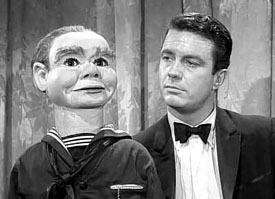 Something of a marvel of an episode of Rod Serling's The Twilight Zone is The Dummy (season 3, episode 3, 1962), inspired by Michael Redgrave's performance as the ventriloquist in the anthologiy film Dead of Night (1945).
Something of a marvel of an episode of Rod Serling's The Twilight Zone is The Dummy (season 3, episode 3, 1962), inspired by Michael Redgrave's performance as the ventriloquist in the anthologiy film Dead of Night (1945).
Cliff Robertson even looks a bit like Redgrave, & seems to have patterned the performance after the original.
The script is by Serlling himself, adapting an unpublished short story by Lee Polk, a producer of children's television programming.
The tale does not try to disguise its origin, even duplicating the scene in Dead of Night when Hugo bites Max. But this version of the familiar tale has a very different "twist" that made it all very much worthy of retelling in a new manner.
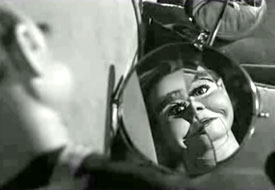 Jerry (Robertson) is vulnerable, an alcoholic, & decidedly schizophrenic. Jerry (Robertson) is vulnerable, an alcoholic, & decidedly schizophrenic.
His dummy Willie is "a brash stick of kindling" according to Serling in the introduction, & when Jerry tries to leave Willie behind, the menacing voice is still in his head (the voice is provided by George Murdock).
It seems the dummy is indeed alive, as we see him moving & speaking even without Jerry's help, but as Jerry's definitely mentally ill, the greater probability is that he's hallucinatory.
I remember seeing this episode when I was kid, & the last scene showing the manner by which the dummy becomes the "handsome" one of the act, really freaked me out. It's an amazingly creepy ending to a truly strange episode, & a brilliant addition to the fiilmic literature of diabolical dummies.
Willie (voiced by Geroge Murdock) knows full well he's the genius of two, & he's sick of being the dufus in the act. He wants a make-over to be a handsome dummy, & gets it by transforming Jerry's good looks to himself. By the end, the transference is complete, & creepier than all get-out.
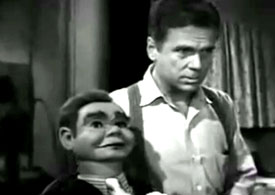 The same dummy from The Dummy was recycled two seasons later in in Caesar & Me (season 5 episode 28, 1964), with pretty much the same theme, not at all the same horrific treatment, & a weak episode overall, however odd.
The same dummy from The Dummy was recycled two seasons later in in Caesar & Me (season 5 episode 28, 1964), with pretty much the same theme, not at all the same horrific treatment, & a weak episode overall, however odd.
The script was credited to Adele T. Strassfield (whose only other imdb credit is an episode of Gilligan's Island). But William Froug (producer on the last few Twilight Zone episodes before heading over to Gilligan's Island) claimed he & Adele wrote it together.
Unfortunately it was a plagiarized script that landed the production in court. As they hadn't even bothered to change the title, the case was cut & dried.
After a cash settlement, the episode withdrawn from circulation for many years. That the plagiarized author had himself gotten the idea from old films & a previous Twilight Zone episode probably justified keeping his name off the credits to this day.
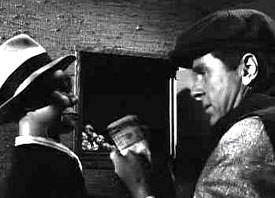 Jackie Cooper, faking a terrible Irish brogue, plays Jonathan West, good natured ventriloquist who has next to no talent & is failing at his chosen profession. Jackie Cooper, faking a terrible Irish brogue, plays Jonathan West, good natured ventriloquist who has next to no talent & is failing at his chosen profession.
You'd think with a supernatural dummy he'd have an amazing act, but his material is rather moronic: "There's a man outside with a wooden leg named Smith," says Jonathan. "Is that so?" says Little Caesar, "What's the name of his other leg?"
Cooper really was a charming character actor, & almost makes the story work, though that phony brogue, poorly sustained, burdens the performance.
He's flat broke & has even pawned his grandfather's watch, for a lousy five dollars. although he's too decent a guy to be a criminal, his dummy Little Caesar, "a small splinter with big ideas" according to Rod's opening narration -- has no such qualms, & convinces Jonathan to take to robberies, including of the niteclub that refused to hire their act.
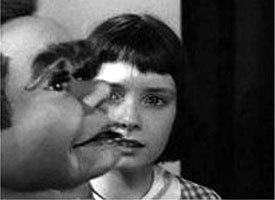 Like ventriloquists in similar situations, as in Dead of Night, so too in The Dummy, Jonathan develops a drinking problem. Like ventriloquists in similar situations, as in Dead of Night, so too in The Dummy, Jonathan develops a drinking problem.
Only in this case it is the dummy who drives him to drink, as he was neither a thief nor a drinker nor mentally ill before he met the dummy. This is just a straightforward diabolical creaturea, not an extension of the possessor's personality.
So there's no ambiguity about Caesar. He's definitely alive. He talks & moves without the slightest touch from Jonathan. The lack of ambiguity makes the premise seem rather shallow when compared to similar tales.
To flesh out the story, an obnoxious & very nosy child (Susanne Cupito, who later changed her name to Morgan Brittany when her child acting career was only weighing down her adult career) is tossed into the cast.
She figures out Jonathan is a thief & gets him arrested, followed by the moronic implication that Caesar & the kid live happily ever after, since the kid is as evil-minded as the doll. Though we might hope Caesar screws up her malicious little life too.
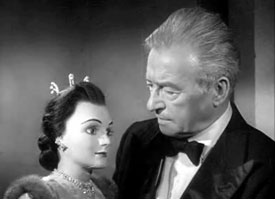 An episode of Alfred Hitchcock Presents likewise draws from the classic Dead at Night, namely And So Died Riabouchinska (season 1, episode 20, 1956).
An episode of Alfred Hitchcock Presents likewise draws from the classic Dead at Night, namely And So Died Riabouchinska (season 1, episode 20, 1956).
It's a psychologicial tale of terror & madness based on a short story by Ray Bradbury, & starring Claude Rains as ventriloquist John Fabian & Charles Bronson as the police detective investigating a murder in a vaudeville house, of a homely juggler named Luke Ahkum.
An array of brilliant character actors fill out the cast for a real sense of back-stage vaudeville culture, with a feature-film-worthy cinematography.
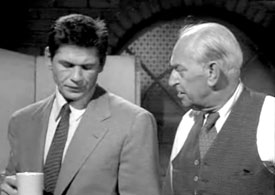 Fabian's wife Alice (Claire Carleton) is jealous of her ventriloquist husband's female dummy, without realizing just how much more than justified her feelings are. Fabian's wife Alice (Claire Carleton) is jealous of her ventriloquist husband's female dummy, without realizing just how much more than justified her feelings are.
She began cheating on him, as she'd become very lonely as he devoted his entire life to his craft, & to Riabouchinska.
The dummy is voiced by Virginia Gregg in a throaty manner quite convincing as a man doing a female puppet's voice. The voice is done perfectly to be seductively feminine yet husky, & the character really springs to life.
The dummy is seemingly more aware of reality than is Fabian, whose relationship with Riabouchinska is distinctly perverse.
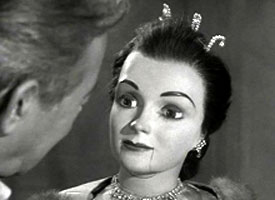 If Fabian is speaking, he's probably confabulating; but through the dummy, he is incapable of lying. He idolizes her & regards her as incapable of duplicity, so indeed she can only speak truthfully. If Fabian is speaking, he's probably confabulating; but through the dummy, he is incapable of lying. He idolizes her & regards her as incapable of duplicity, so indeed she can only speak truthfully.
Their "affair" is certainly demented, yet there's something so sweet about his endearments for the Russian beauty made of wood.
Like Redgrave's character in Dead of Night, Fabian cannot tell the truth of the murder, but through Riabouchinska, he can hide neither his crime nor his perversity. Unlike Hugo & just about every other dummy in tales of mad ventriloquists, Riabouchinska is not diabolical, but closer to angelic.
Rain's incredible performance & the elegance of the dummy herself make this a startling & poetic thriller. Rain's last sad look as Riabouchinska gives up her "life" is, despite the bizarreness, strangely heroic of the doll.
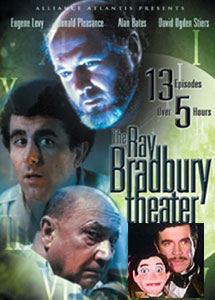 Ray Bradbury personally prepared a new screenplay for the same story for The Ray Bradbury Theater (season 2, episode 12, 1988), with Alan Bates as Fabian.
Ray Bradbury personally prepared a new screenplay for the same story for The Ray Bradbury Theater (season 2, episode 12, 1988), with Alan Bates as Fabian.
This cable anthology version isn't bad, as Bates is a fine actor even if not the equal of Claude Rains.
The magic of the original is that of a film noir which is lost in the color remake, but it tells the same deviant story, which is inescapably mindbogglingly strange. It's included among the bakers-dozen episodes on the dvd Ray Bradbury Theater Volume 2.
In 1987 the story was also done as an episode of the radio version of Ray Bradbury Theater, but much more dreadfully voiced by an uninteresting cast. The doll in particular was closer to Mickey Mouse than the sensual doll the story required.
The short story was first published in The Saint Detective Magazine, the June/July issue of 1953, & handily available in Ray's collection The Machineries of Joy (Bantam, 1965).
But curiously enough, it's very first version was on the radio program Suspense in 1947, not all that long after Dead of Night made such a splash in first release, inducing many imitations of that anthology fiilm's episode The Ventriloquist Dummy.
That early radio script had been prepared from a mere outline of the as-yet unwritten short story. Both radio versions are in circulation on CDs & as MP3 downloads.
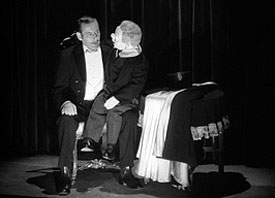 Alfred Hitchcock Presents provided another variant of the theme with The Glass Eye (season 3 episode 1, 1957).
Alfred Hitchcock Presents provided another variant of the theme with The Glass Eye (season 3 episode 1, 1957).
After the death of spinster Julia (Jessica Tandy), her cousin Jim (William Shatner) & his wife Dorothy (Rosemary Harris) are packing up the remnants of her life, he shows his wife a glass eye which Julia kept in a special box.
"I only learned about it long after it happened," he said, & tells the tale of the only time Julia dreamed of love.
Julia had been in her thirties, her life "lonely & desolate," when she became enamored of a handsome ventriloquist, Max Collodi (Tom Conway), the Gentleman Ventriloquist. It's no coincidence the ventriloqluist of Dead of Night is also named Max.
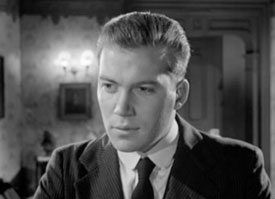 She began attending all Collodi's shows, & when alone in her apartment afterward, she fantasized a life with Max. She began attending all Collodi's shows, & when alone in her apartment afterward, she fantasized a life with Max.
When he left town to tour the provinces, she quit her horrible job & began living on her savings in order to follow him from town to town, a secret admirer & a permanent fixture of his audiences.
She wrote him letters & often begged to meet him in person, & he always wrote back, but said always that he did not give interviews. The day came, however, when he agreed to a tryst in his hotel room, warning her he has only five minutes for her but that they might later have longer appointments if she still wished to know him better.
Their meeting, in Max's shadowy apartment, begins as the loveliest moment of her life. He sits almost motionless across from her at a table, his dummy at his side, & speaks of the same hopes for their future together as she had dreamed.
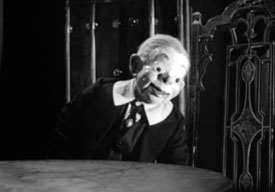 But as her "five minutes" comes to a close, her dream of romance turns to horror when she discovers that the ventriloquist is the actual dummy, while the hideous George, mistaken by all for the dummy, was in fact the ventriloquist (played by Billy Barty). But as her "five minutes" comes to a close, her dream of romance turns to horror when she discovers that the ventriloquist is the actual dummy, while the hideous George, mistaken by all for the dummy, was in fact the ventriloquist (played by Billy Barty).
When the handsome manniquen fell over, Julia as yet not realizing the truth hurries to his aid, takes his head in her arms only to have it come loose from the body, & a glass eye pops out.
The story's main unbelievable note is that Julia fled the scene in terror, & yet managed to take the glass eye as a macabre momento. It's otherwise a splendid episode, beautifully acted on Tandy's part, with a real sense of the pathos of cruelly ruined dreams.
It could be criticized for the assumption that a good match would be impossible with a little person, but the shock of her discovery may have nixed any chance at an openminded response. And it's a fun episode to watch a second time to see how Max in fact does behave rather like a dummy, while the dummy has all the life & motion.
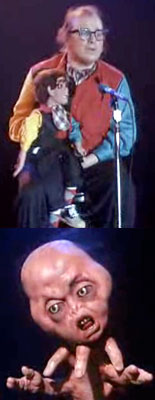 The jesting Cryptkeeper (himself a puppet, voiced by John Kessir), of the cable series Tales from the Crypt, introduces us to a little ventriloquist doll named Dicky, who insults the Cryptkeeper, so is soon thrown in the fireplace. He then introduces The Ventriloquist's Dummy (Season 2, episode 10, 1990), tossing off bad puns left & right.
The jesting Cryptkeeper (himself a puppet, voiced by John Kessir), of the cable series Tales from the Crypt, introduces us to a little ventriloquist doll named Dicky, who insults the Cryptkeeper, so is soon thrown in the fireplace. He then introduces The Ventriloquist's Dummy (Season 2, episode 10, 1990), tossing off bad puns left & right.
It opens with a stage act of jokes that aren't that great, but which Don Rickles, as Ingels the ventriloquist, is brilliant at making funny even so. The club is very adults-only, but in the front row is a nurdy little boy, Billy (Courtney Mellinger), son of a chorus girl. He is a devoted fan of Ingels, & wants to be a ventriloquist himself when he grows up.
There's only the tiniest intimation of something amiss before the fire at the club, on what would be the last night Ingels performed anywhere.
The tale jumps fifteen years later before we even know a showgirl died that night. Ingels asserts that his right hand was burnt off. He keeps the "missing" hand wrapped up, in wrapping bigger than a softball.
Billy Goldman grew up to be played by Don Rickles' fellow comedian, Bobcat Goldthwait. He now has his own dummy named Tim, but he's absolutely terrible at the art. He tracks down his old hero, a crabby old retiree & recluse.
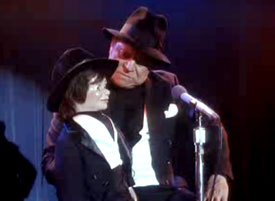 Billy invites Ingels to attend an amateur-night performance which will be his first time doing his act in front of an audience. Ingels isn't interested, but Billy's so pitiful the old guy shows up after all. Billy invites Ingels to attend an amateur-night performance which will be his first time doing his act in front of an audience. Ingels isn't interested, but Billy's so pitiful the old guy shows up after all.
It's the old club where Ingels last performed. Billy's totally excited that his hero showed up to see the act. It's crazily pathetic, as Billy can barely do a voice different from his own, moves his lips, is shy & scared on stage, & even managed to drop his dummy so that the head rolled away.
What he hoped would be a dream come true turned into the worst night of his life, & Ingels walked out feeling pretty down about it himself.
That same night a woman is murdered near the club, & it looks like Ingels may have been the villain. Billy at least suspects the old ventriloquist & hurries to Ingels' house. He catches him preparing to shoot up. "You're a junky! To think I admired you!" he screams, & grabs away Ingels' morphine & destroys the bottle before he shoots up.
[MAJOR SPOILER ALERT!] Ingels denies being the killer. He insists it's Morty, the dummy. "He hates women. He's never been able to have women in a normal way. Oh, I tried to stop him. There's no reasoning with Morty. He's very willful. And very psychotic."
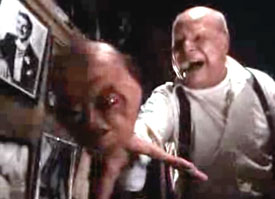 Billy goes from angry disappointment to sadness, sure as he is that Ingels is mentally ill. "You better go out," says Ingels. "Before Morty tries to hurt you." Billy goes from angry disappointment to sadness, sure as he is that Ingels is mentally ill. "You better go out," says Ingels. "Before Morty tries to hurt you."
Billy takes Morty's suitcase down from a shelf, opens it to remove the dummy, trying to prove to Ingels that Morty is just cloth & wood.
But the unpacked dummy has no head s. It's then Ingels, flying into a rage, unwraps his hand, which isn't a hand but a head with a couple of finger-like limbs -- Morty being his parastic twin.
With two great comedians to act out the climax, it's wonderfully loony, surprisingly creepy though over-the-top ridiculous too. Morty nearly controls Ingels, who picks up a chopping knife & attacks Billy while both Ingels & Morty rail against the fool. Ingels' morphine had never been for himself, but was only injected into his "hand." But Billy destroyed the last of the morphine, & now Morty's in control!
As Billy fights & argues for his life, Ingels struggles to stop what he's doing. He eventually gets enough control to hack off his own "hand."
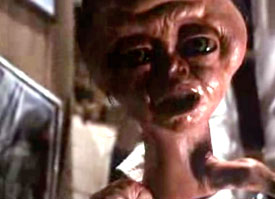 "I'm finally free!" shouts Ingels, & for a moment it appears that both men are saved. But Morty hops up on his finger-like limbs & exclaims, "I'm the one who's finally free!" as he leaps forth & bites out Ingels' throat. "I'm finally free!" shouts Ingels, & for a moment it appears that both men are saved. But Morty hops up on his finger-like limbs & exclaims, "I'm the one who's finally free!" as he leaps forth & bites out Ingels' throat.
As a final battle pushes the absurd to greater heights, Morty is very nearly run through a meat grinder before he makes a bargain for his life, to help make Billy the successful ventriloquist he always dreamed of being. And this results in a revolting little twist in the end that is best left undescribed [END SPOILERS].
This cable series always went for the laughs instead of the horror so was invariably silly, & never a favorite of mine.
But this episode is fantastic, & it's no surprise to me that comedians are better equipped to capture both the horror & the comedy in perfect measures, as opposed to most of the actors to appear in the series who are either undermined in their attempt at comedy by the horror, or more commonly fail to convey anything horrible because the scripts were so silly. This one really works, though, silly or no.
All Tales from the Crypt teleplays were adapted from the E.C. comic book of the same name. This was was from Tales of the Crypt #28, February/March 1952. The original story was written by Al Feldstein, illustrated by Graham Ingels, for whom Rickles' character was named.
Continue to the next evil ventriloquist doll:
Making Contact; aka, Joey (1985)
copyright © by Paghat the Ratgirl
|
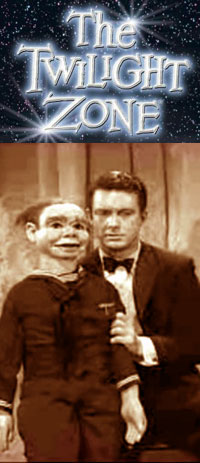

 Jerry (Robertson) is vulnerable, an alcoholic, & decidedly schizophrenic.
Jerry (Robertson) is vulnerable, an alcoholic, & decidedly schizophrenic. The same dummy from The Dummy was recycled two seasons later in in Caesar & Me (season 5 episode 28, 1964), with pretty much the same theme, not at all the same horrific treatment, & a weak episode overall, however odd.
The same dummy from The Dummy was recycled two seasons later in in Caesar & Me (season 5 episode 28, 1964), with pretty much the same theme, not at all the same horrific treatment, & a weak episode overall, however odd. Jackie Cooper, faking a terrible Irish brogue, plays Jonathan West, good natured ventriloquist who has next to no talent & is failing at his chosen profession.
Jackie Cooper, faking a terrible Irish brogue, plays Jonathan West, good natured ventriloquist who has next to no talent & is failing at his chosen profession. Like ventriloquists in similar situations, as in Dead of Night, so too in The Dummy, Jonathan develops a drinking problem.
Like ventriloquists in similar situations, as in Dead of Night, so too in The Dummy, Jonathan develops a drinking problem. An episode of Alfred Hitchcock Presents likewise draws from the classic Dead at Night, namely And So Died Riabouchinska (season 1, episode 20, 1956).
An episode of Alfred Hitchcock Presents likewise draws from the classic Dead at Night, namely And So Died Riabouchinska (season 1, episode 20, 1956). Fabian's wife Alice (Claire Carleton) is jealous of her ventriloquist husband's female dummy, without realizing just how much more than justified her feelings are.
Fabian's wife Alice (Claire Carleton) is jealous of her ventriloquist husband's female dummy, without realizing just how much more than justified her feelings are. If Fabian is speaking, he's probably confabulating; but through the dummy, he is incapable of lying. He idolizes her & regards her as incapable of duplicity, so indeed she can only speak truthfully.
If Fabian is speaking, he's probably confabulating; but through the dummy, he is incapable of lying. He idolizes her & regards her as incapable of duplicity, so indeed she can only speak truthfully. Ray Bradbury personally prepared a new screenplay for the same story for The Ray Bradbury Theater (season 2, episode 12, 1988), with Alan Bates as Fabian.
Ray Bradbury personally prepared a new screenplay for the same story for The Ray Bradbury Theater (season 2, episode 12, 1988), with Alan Bates as Fabian. Alfred Hitchcock Presents provided another variant of the theme with The Glass Eye (season 3 episode 1, 1957).
Alfred Hitchcock Presents provided another variant of the theme with The Glass Eye (season 3 episode 1, 1957). She began attending all Collodi's shows, & when alone in her apartment afterward, she fantasized a life with Max.
She began attending all Collodi's shows, & when alone in her apartment afterward, she fantasized a life with Max. But as her "five minutes" comes to a close, her dream of romance turns to horror when she discovers that the ventriloquist is the actual dummy, while the hideous George, mistaken by all for the dummy, was in fact the ventriloquist (played by Billy Barty).
But as her "five minutes" comes to a close, her dream of romance turns to horror when she discovers that the ventriloquist is the actual dummy, while the hideous George, mistaken by all for the dummy, was in fact the ventriloquist (played by Billy Barty). The jesting Cryptkeeper (himself a puppet, voiced by John Kessir), of the cable series Tales from the Crypt, introduces us to a little ventriloquist doll named Dicky, who insults the Cryptkeeper, so is soon thrown in the fireplace. He then introduces The Ventriloquist's Dummy (Season 2, episode 10, 1990), tossing off bad puns left & right.
The jesting Cryptkeeper (himself a puppet, voiced by John Kessir), of the cable series Tales from the Crypt, introduces us to a little ventriloquist doll named Dicky, who insults the Cryptkeeper, so is soon thrown in the fireplace. He then introduces The Ventriloquist's Dummy (Season 2, episode 10, 1990), tossing off bad puns left & right. Billy invites Ingels to attend an amateur-night performance which will be his first time doing his act in front of an audience. Ingels isn't interested, but Billy's so pitiful the old guy shows up after all.
Billy invites Ingels to attend an amateur-night performance which will be his first time doing his act in front of an audience. Ingels isn't interested, but Billy's so pitiful the old guy shows up after all. Billy goes from angry disappointment to sadness, sure as he is that Ingels is mentally ill. "You better go out," says Ingels. "Before Morty tries to hurt you."
Billy goes from angry disappointment to sadness, sure as he is that Ingels is mentally ill. "You better go out," says Ingels. "Before Morty tries to hurt you." "I'm finally free!" shouts Ingels, & for a moment it appears that both men are saved. But Morty hops up on his finger-like limbs & exclaims, "I'm the one who's finally free!" as he leaps forth & bites out Ingels' throat.
"I'm finally free!" shouts Ingels, & for a moment it appears that both men are saved. But Morty hops up on his finger-like limbs & exclaims, "I'm the one who's finally free!" as he leaps forth & bites out Ingels' throat.